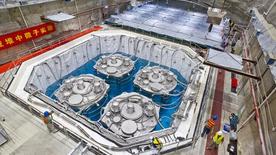
Researchers from the Yale Wright Laboratory and the Department of Physics are part of three innovative experiments that recently won the 2016 Breakthrough Prize in Fundamental Physics.
Presented at a ceremony in California earlier this month, the Breakthrough Prize honors advances in fundamental physics, life sciences, and mathematics. The prize often is awarded to more than one activity in each category.
There were five experiments honored in the fundamental physics category, each one relating to the discovery that neutrinos have mass and oscillate. Neutrinos are subatomic particles that carry no electric charge and move through the universe almost entirely unaffected by natural forces.
Karsten Heeger, director of the Yale Wright Laboratory and a professor of physics, was a team member on three of the winning experiments. “I feel very fortunate to have been part of three major experiments that have shaped our understanding of solar and reactor neutrinos and demonstrated that the Standard Model of Particle Physics is incomplete,” Heeger said. “With each experiment we developed a deeper understanding of the phenomenon of neutrino oscillation.”
Conducted at the Sudbury Neutrino Observatory, Heeger’s thesis work helped lead to the discovery that electron neutrinos produced in the Sun change to other “flavors” before reaching Earth. Heeger also was part of the team that built a set of detectors for the final phase of the experiment.
As a Chamberlain Fellow at the U.S. Department of Energy’s Lawrence Berkeley National Laboratory, Heeger was part of the KamLAND collaboration, which demonstrated for the first time the oscillation of electron antineutrinos from nuclear reactors. Heeger designed, built, and operated the full-volume calibration system that characterized the response of the kilo-ton liquid scintillator detector.
Since 2006, Heeger has been a leading member of the Daya Bay collaboration. He led the development and construction of the experiment’s antineutrino detectors and is a member of the Daya Bay executive board.
Senior scientist Henry Band and visiting researcher Thomas Wise, both of the Yale Wright Laboratory, were part of Heeger’s group at Daya Bay and played crucial roles in the design, construction, and commissioning of the Daya Bay antineutrino detectors. Wise led the technical research and development on the liquid scintillation detection system, and Band coordinated the on-site detector commissioning.
Heeger, Band, and Wise are now working on the development of a new, short-baseline reactor neutrino experiment called PROSPECT.
The 2016 Breakthrough Prize awarded a combined $21.9 million, including $3 million in the fundamental physics category.
- YaleNews press release